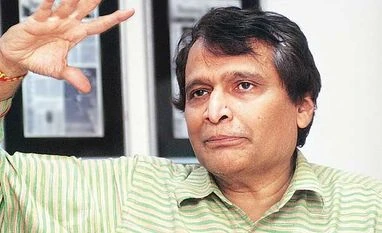Speaking at the World Economic Forum’s India Economic Summit, Prabhu said he was working closely with the finance ministry and other departments to formulate the policy initiative by studying various sectors. His remarks came a day after Prime Minister Narendra Modi said measures would be taken to reverse the trend of declining economic growth
“I am personally working with the Ministry of Finance, the NITI Aayog, and all other government institutions to provide necessary policy as well as fiscal support to ensure that the industry can produce far more than what they are doing today, which will create jobs,” said the minister.
The Centre’s fiscal deficit touched 96 per cent of the Budget Estimates by August despite heavy expenditure compression measures. India’s economy grew 5.7 per cent in the first quarter of 2017-18, the lowest under the Modi government, with many experts attributing it to the implementation of the goods and services tax (GST) and the lingering impact of demonetisation. This prompted the Reserve Bank of India to cut its growth forecasts, even as it did not slash rates.
The index of industrial production (IIP) grew just 1.2 per cent in July, the first month of the GST roll-out, after a contraction in June. However, the core sector grew about 5 per cent in August, a five-month high.
Pointing out the need to bring in enabling legislation and ideas that the private sector can hold on to, the minister said the government was moving in that direction. “Our aspiration is to become one of the easiest places to do business. My business is to make sure others do their business,” said Prabhu, adding that the ministry was also working on an industrial policy.
The policy, he said, assumed significance as the future of manufacturing would not be same as it was today. “So, we are working on some of the emerging industries,” Prabhu said, suggesting that excess capacity utilisation could be increased by enhancing domestic consumption and exports. During his one month in office, Prabhu said he had met hundreds of trade associations and discussed the creation of more jobs.
At the summit, NITI Aayog Chairman Amitabh Kant, the driver of ‘Make in India’ campaign, said he expected demand to pick up in the next six months on the back of several government initiatives to build infrastructure and spur investment.
Kant said India’s businesses needed to focus on the global market to get higher value of their products. “The value is 10 times in the export market. India cannot grow on the back of the domestic market,” he added.
To read the full story, Subscribe Now at just Rs 249 a month
Already a subscriber? Log in
Subscribe To BS Premium
₹249
Renews automatically
₹1699₹1999
Opt for auto renewal and save Rs. 300 Renews automatically
₹1999
What you get on BS Premium?
-
Unlock 30+ premium stories daily hand-picked by our editors, across devices on browser and app.
-
Pick your 5 favourite companies, get a daily email with all news updates on them.
Full access to our intuitive epaper - clip, save, share articles from any device; newspaper archives from 2006.
Preferential invites to Business Standard events.
Curated newsletters on markets, personal finance, policy & politics, start-ups, technology, and more.
Need More Information - write to us at assist@bsmail.in
)